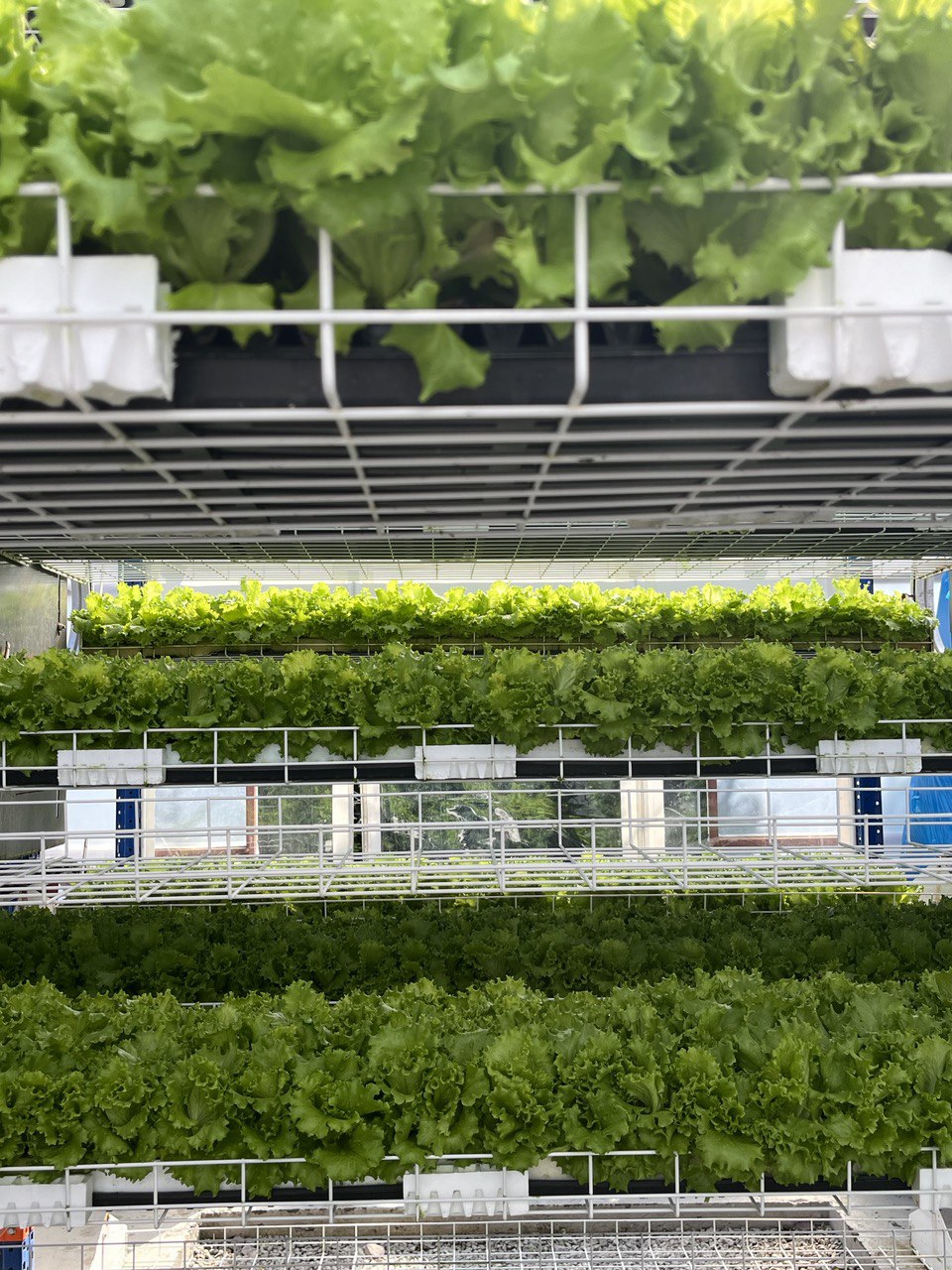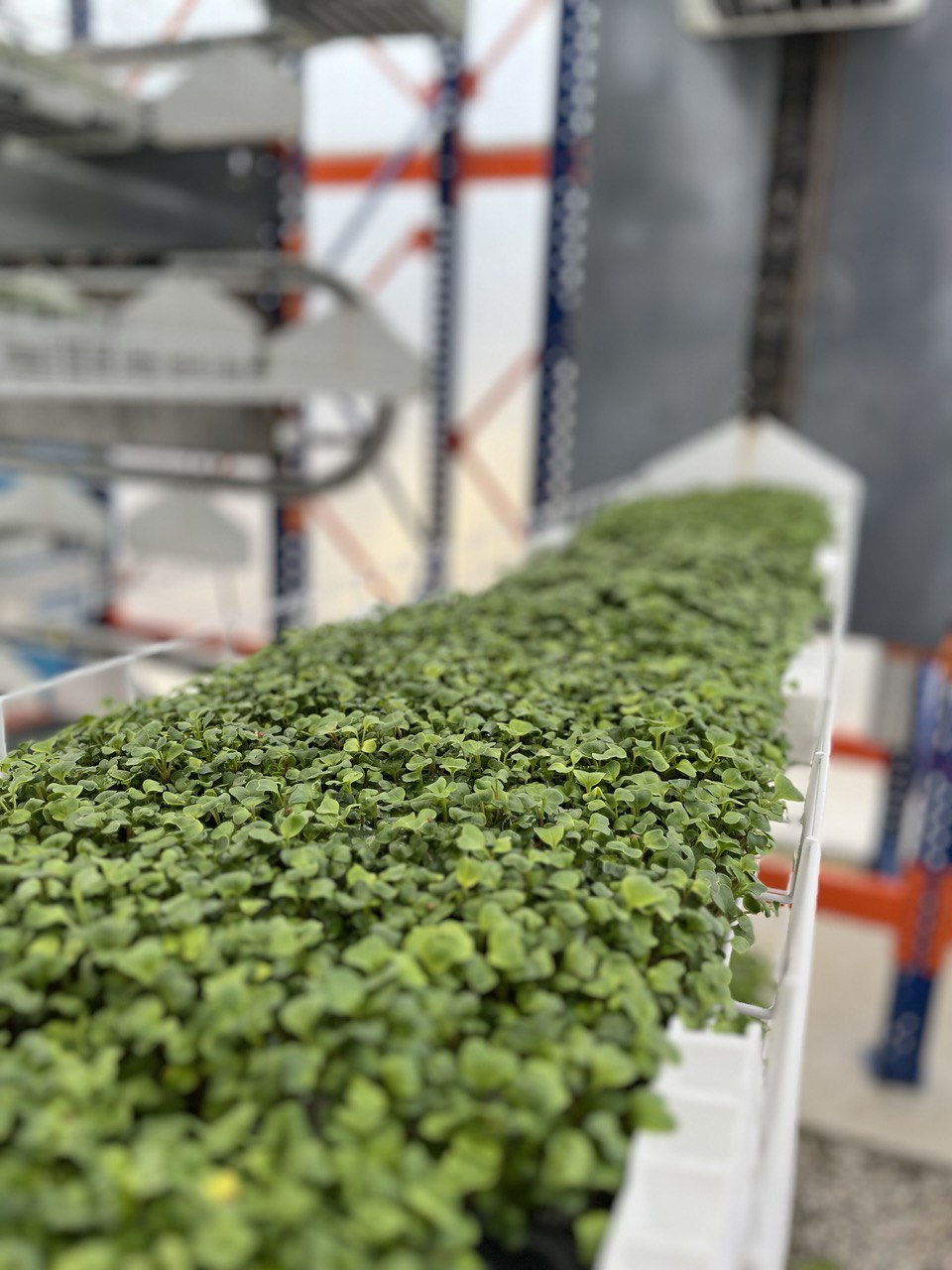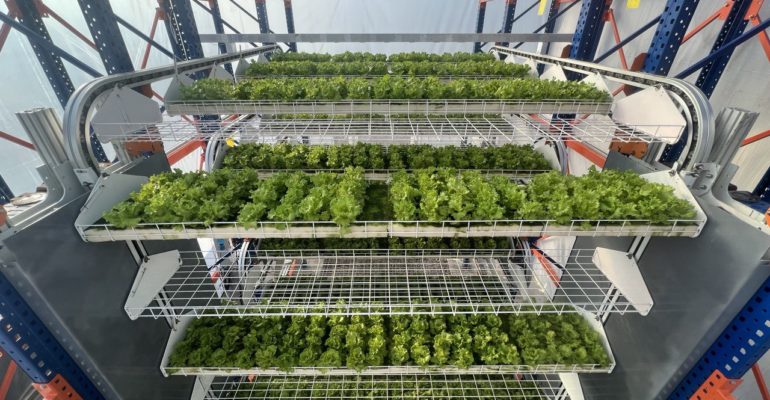Welcome to the AVF network!
Ayola offers a patent in USA technology Multi Layer Conveyor System (MLCS) automated system for growing greens, such as seedlings, salads and green animal feed, tomatoes, cucumbers, pepper, and berries. A distinctive feature of our approach is the complete automation of the growing process and the use of solar (natural) light. With a specific configuration, limiting or completely excluding artificial lighting is possible. System solutions can also be used for automation in other applications, such as growing mushrooms, snails, silkworms, and other growing insects. The solution can be used for storing small-sized cargo with maximum use of the height of the premises.
Thanks to the automation of the process and the use of natural light, the moving conveyor system has a competitive production cost. Food trays drive right up to you, which eliminates the use of stairs and work at height for production personnel. Unlike hydroponics, the agronomic process of direct irrigation (used in our solution) is simple and can be performed with minimal special knowledge. In addition, our irrigation system allows efficient recycled water usage.
The advantages of the Ayola system are:
- Versatility and application in various industries
The vertical conveyor farming technology is universal and allows you to dry vegetables and fruits and grow green vegetables, mushrooms, snails, silkworms, and other insects. It is possible to use the technology universally depending on the climatic conditions and the season. For example, in summer, dry fruits and vegetables; in winter, salads, green food, tomatoes, cucumbers, peppers, and berries grow.
- Efficient use of space
The technology of vertical conveyor farming allows you to automate processes and significantly increase efficiency. As an example of this technology, it is possible to dry 100 tons (4 hectares) of tomatoes daily on a total 1000 m2.
- Reducing the need for labor
The technology of vertical conveyor farming minimizes manual labor and significantly increases the efficiency of the process, thanks to the innovative conveyor mechanism in our technology.
- Environmental friendliness and use of natural light
One of the main features of conveyor vertical farming technology is the creation of conditions that mimic the natural growth of plants. This is achieved using a number of innovative methods that simulate natural conditions.


The technology (in comparison to conventional technology)
| Classic vertical farm | Ayola conveyor farm |
|
|
What makes AYOLA different:
- Maximum use of space by increasing the height to 23 meters. No walkways garden trays are required;
- The conveyor delivers the trays to the automation points from sowing to harvesting, there is no need to move inside the farm;
- Most of the equipment parts are standard, mass-produced, and available in local markets;
- The best efficiency of climate control due to the high density of trays;
- More powerful lamps (less in quantity), fewer sensors and hydration stations – the conveyor will deliver trays to pass by.;
- The best automation possibilities give the maximum opportunity to reduce the workforce;
- Relatively easy to adjust conveyor for new culture or even capacity or dimensions extend.
Possible applications:
- Growing greens, seedlings, salads and green animal feed, tomatoes, cucumbers, pepper, berries;
- Drying tomatoes and other vegetables;
- Cultivating mushrooms, snails, silkworms, and other insects
What is the potential of your technology going forward?
We believe that our vertical conveyor farming technology allows us to replace traditional horizontal hydroponic farms because the cost of our technology is close to the traditional one, while it has greater efficiency.
- Efficiency improvement: Vertical conveyor farming technology can potentially increase efficiency in the agricultural industry. By growing crops in vertically stacked layers, farmers can increase yields per unit area, reduce water consumption and improve plant nutrient uptake.
- Sustainable production: Vertical conveyor farming farms can use advanced technology to reduce waste and environmental pollution, leading to more sustainable food production. A controlled environment on vertical farms can also reduce the need for pesticides and herbicides, resulting in healthier and safer food.
- Year-round production: Vertical conveyor farming technology allows you to produce products all year round, regardless of the weather or season. This can be a significant advantage for regions with a limited growing season, meaning consumers can enjoy fresh produce year-round.
- Urban farming: With the increase in the number of people living in urban areas, the demand for locally produced food is growing. Vertical conveyor farms can be built in urban areas taking up less space than traditional vertical farms, providing urban residents with fresh, healthy products and reducing the environmental impact of transporting food over long distances.
- Technological advances: With further development, the technology of vertical conveyor farming can become even more efficient and cost-effective. Developments in lighting, automation, and data analysis can help farmers optimize their operations and increase crop yields.
What are your goals for the future?
Innovations: one of the last industries where conveyor production is not widely used is- greenhouses; when switching to conveyor production, this can help bring efficiency, environmental friendliness, and accessibility. To enable people with increased needs and the retirement age to work in a comfortable environment. Minimal use of stairs, movement of employees in the greenhouse, and workspace convenience.
Environmental friendliness: This includes reducing energy and water consumption, minimizing waste, using environmentally friendly crop growth methods, and reducing the carbon footprint.
Community engagement: Engaging with the local/foreign community and raising awareness of the benefits of vertical conveyor farming
Expansion: To expand the activities of Ayola vertical farm by building new facilities or increasing the size of our current enterprise. This could increase production, enter new markets and increase profitability.
Profitability: Increase revenue, reduce costs, or increase profitability through strategic marketing and operational improvements.




Comments are closed.